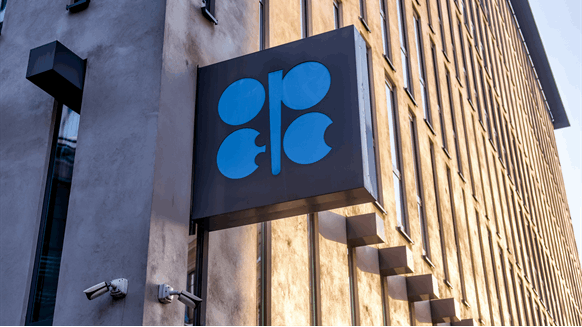
OPEC+ agreed to a modest increase in its November oil production as group leaders Saudi Arabia and Russia overcame a difference in position.
The Organization of the Petroleum Exporting Countries and its allies will add 137,000 bpd next month, OPEC confirmed in a statement on its website.
Russia, which has previously pushed for restraint in supply boosts, favored an adjustment that would help to defend prices while Saudi Arabia — more mindful of market share — supported a larger addition, a delegate said prior to Sunday’s gathering.
Oil prices traded near a four-month low on Friday, a reminder of the careful balancing act for OPEC and allies as they return supply to a market in surplus.
The group shocked the market back in April, announcing the accelerated return of barrels into a market that analysts said was heading for surplus. Once that first tranche — 2.2 million bpd — was restored, they then immediately moved onto returning the next layer — about 1.65 million bpd in total — albeit at a slower pace.
While prices have held up relatively strongly to the supply added so far, there are now signs that the market is starting to shift. Unsold cargoes from the Middle East are accumulating and the futures forward curve is showing signs of near-term weakness. The International Energy Agency anticipates that inventories will pile up rapidly this quarter and that a record surplus will emerge in 2026 as global demand cools and supply across the Americas booms.
Despite the risk of booming supply, two delegates said that there was no discussion of a surplus on Sunday. OPEC has long given a less-bearish analysis of the global oil market than the IEA. The meeting lasted for 9 minutes, as it did a month earlier — an indication of the work that goes on before formal talks begin. The next gathering will be on Nov. 2.
Saudi Arabia, which had borne the largest share of the production curtailments now being unwound, has led the group in its strategy shift to increase production in order to regain market share. Sunday’s decision also comes ahead of a trip to Washington next month by Saudi Crown Prince Mohammed bin Salman for a meeting with President Donald Trump, who has called repeatedly for lower oil prices.
Saudi and Russian officials didn’t immediately respond to requests for comment.
The series of production hikes has also demonstrated the limitations to spare capacity actually available across the OPEC+ alliance. The eight key OPEC+ members restored only about 60% of the 2.2 million barrel—a-day supply tranche scheduled between May and September, in part because certain countries are compensating for prior overproduction, but also signaling that some members may already be pumping almost as much as they can.
Source: Grant Smith, Salma El Wardany, Nayla Razzouk and Fiona MacDonald
